Introduction
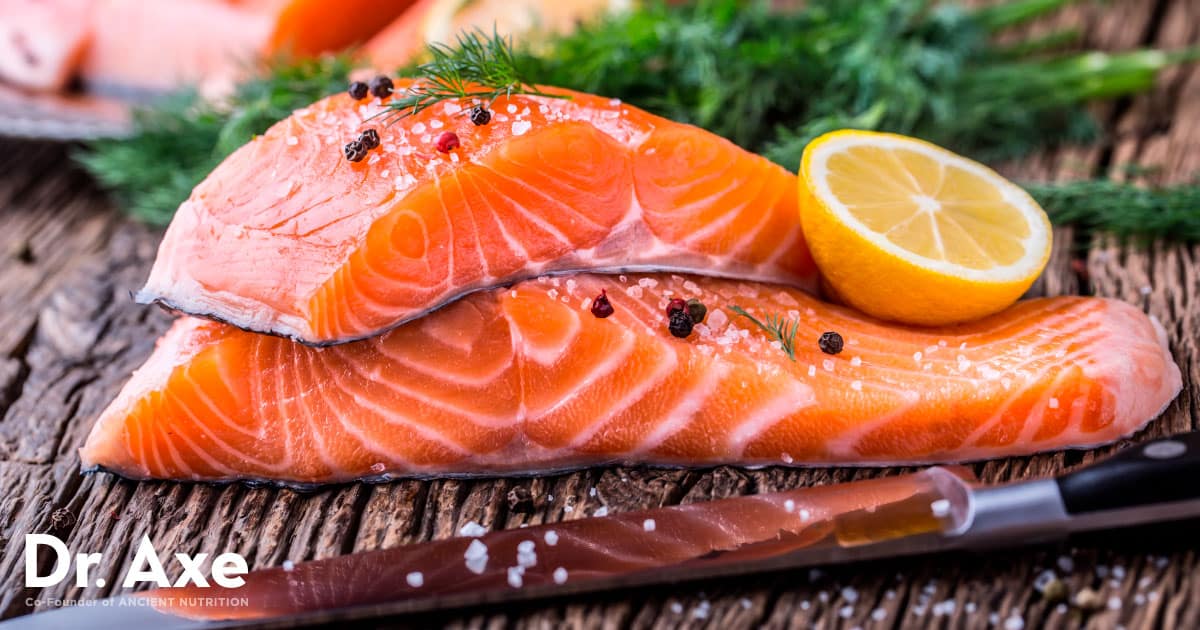
Raw salmon is a popular choice among seafood enthusiasts due to its unique taste and texture. Whether enjoyed as sushi, sashimi, or tartare, raw salmon offers a plethora of health benefits. Packed with essential vitamins, minerals, and omega-3 fatty acids, this nutritious fish promotes overall well-being. In addition, consuming raw salmon can help improve heart health, reduce inflammation, boost brain function, and enhance skin health. However, it is crucial to take safety precautions and ensure the freshness and quality of the salmon before consuming it raw. Let’s explore the various health advantages of incorporating raw salmon into your diet.
What Is Raw Salmon?
Raw salmon refers to the uncooked flesh of the salmon fish. It is usually consumed in various raw preparations such as sushi, sashimi, or tartare. Raw salmon is prized for its delicate texture and distinct flavor, which is often described as buttery and mild. It is important to note that raw salmon should be of high quality and freshness to ensure safety and minimize the risk of foodborne illnesses associated with consuming raw seafood. When handled and prepared properly, raw salmon can offer numerous health benefits due to its rich nutritional profile.
Why Is Raw Salmon Popular?
Raw salmon is popular for its unique taste and texture. It offers a melt-in-your-mouth experience that is highly desired by seafood lovers. The buttery and mild flavor of raw salmon is a favorite in dishes like sushi, sashimi, and tartare. Additionally, raw salmon is known for its high nutritional value, especially in omega-3 fatty acids, which support heart health. The popularity of raw salmon is also influenced by its versatility in various culinary preparations and its association with a healthy and balanced diet.
Nutritional Value Of Raw Salmon
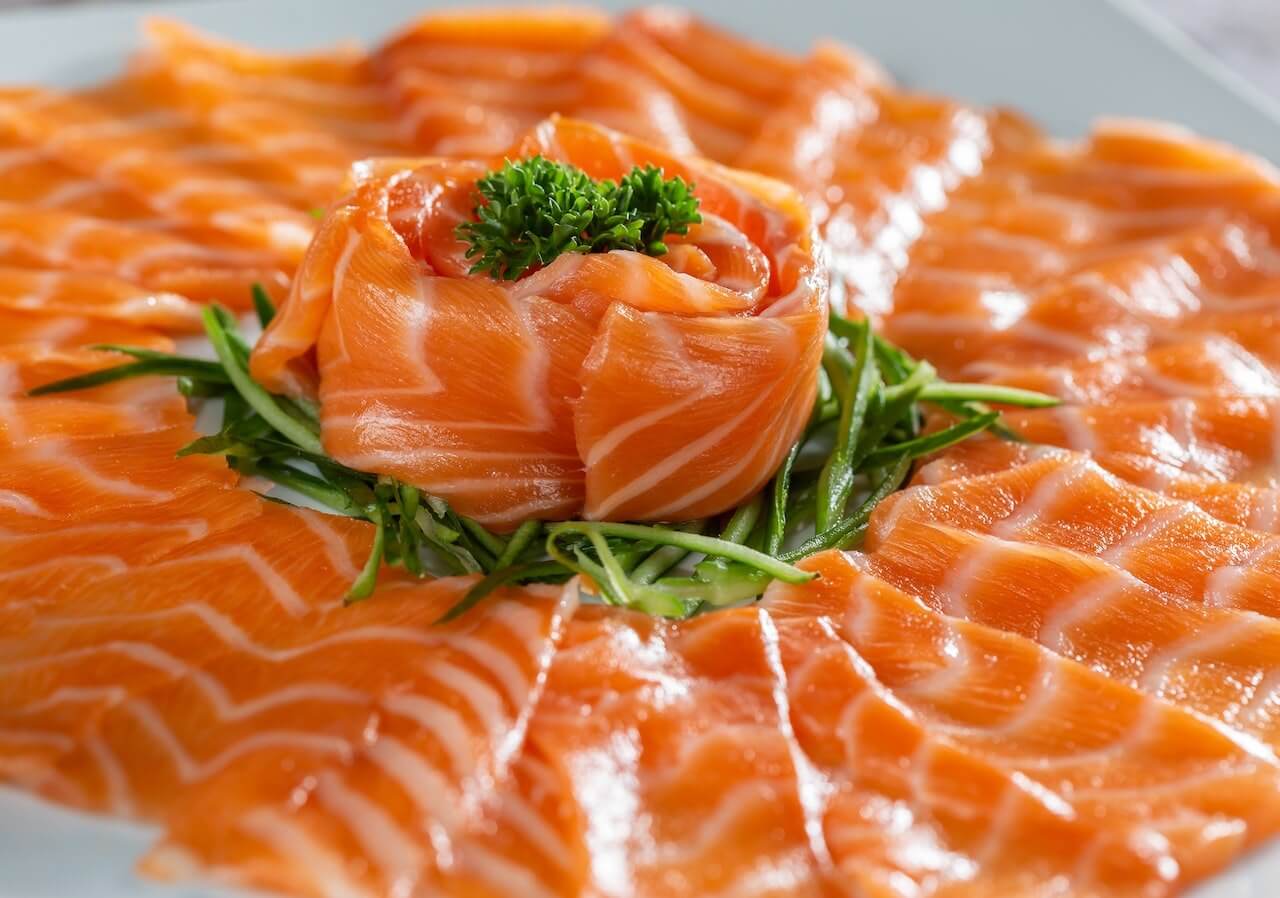
Raw salmon is not only delicious but also packed with essential nutrients. It is a great source of high-quality protein, which is necessary for muscle growth and repair. Raw salmon is rich in vitamins such as vitamin D, vitamin B12, and vitamin B6, all of which play vital roles in maintaining a healthy body. Additionally, it contains minerals like selenium, potassium, and magnesium, which are important for various bodily functions. Moreover, raw salmon is known for its high content of omega-3 fatty acids, which are beneficial for heart health. Overall, raw salmon is a nutrition powerhouse that provides numerous health benefits when consumed.
Vitamins And Minerals In Raw Salmon
Raw salmon is a nutrient powerhouse, providing essential vitamins and minerals. It is rich in vitamin B12, which is important for nerve function and the production of red blood cells. Raw salmon also contains vitamin B6, which helps in brain development and function. Additionally, it is a good source of vitamin D, crucial for bone health and immune system function. Salmon is packed with minerals like selenium, potassium, and magnesium, which play vital roles in various bodily functions. Including raw salmon in your diet can help ensure that you receive these important vitamins and minerals. [7]
Omega-3 Fatty Acids In Raw Salmon
Raw salmon is a rich source of omega-3 fatty acids, which are essential for maintaining optimal health. These fatty acids have numerous benefits, including improved brain function, decreased risk of cardiovascular problems such as heart attack and stroke, and reduced inflammation in the body. Omega-3s also play a crucial role in promoting joint health and protecting against age-related cognitive decline. Adding raw salmon to your diet is an excellent way to ensure you are getting an adequate intake of these important fatty acids. [10]
Health Benefits Of Consuming Raw Salmon

Consuming raw salmon offers numerous health benefits. The high levels of omega-3 fatty acids found in raw salmon can improve heart health by reducing the risk of cardiovascular problems such as heart attacks and strokes. Additionally, these fatty acids help to lower inflammation in the body, which is beneficial for overall health. Raw salmon also promotes brain health by enhancing cognitive function and reducing the risk of neurodegenerative diseases. Furthermore, consuming raw salmon can contribute to improved skin health, providing nourishment and hydration while reducing signs of aging. Enjoying raw salmon in moderation can be a healthy addition to one’s diet. [11][12]
Improved Heart Health
Eating raw salmon can significantly improve heart health. The high levels of omega-3 fatty acids found in raw salmon help to reduce the risk of cardiovascular problems such as heart attacks and heart arrhythmias. These fatty acids are known to lower inflammation in the body, which is a key contributor to heart diseases. Additionally, raw salmon contains other beneficial compounds like antioxidants and amino acids that promote heart health. Including raw salmon in your diet can support a healthy cardiovascular system and contribute to overall heart health. [13][14]
Reduced Inflammation
Consuming raw salmon can contribute to reduced inflammation in the body. The omega-3 fatty acids present in raw salmon have potent anti-inflammatory properties that help to decrease inflammation levels. Inflammation is a natural response by the body to protect itself from injury or infection, but chronic inflammation can lead to various health problems. By including raw salmon in your diet, you can help to lower inflammation markers and reduce the risk of chronic inflammatory conditions such as heart disease, arthritis, and certain types of cancer. [16]
Raw Salmon And Brain Health
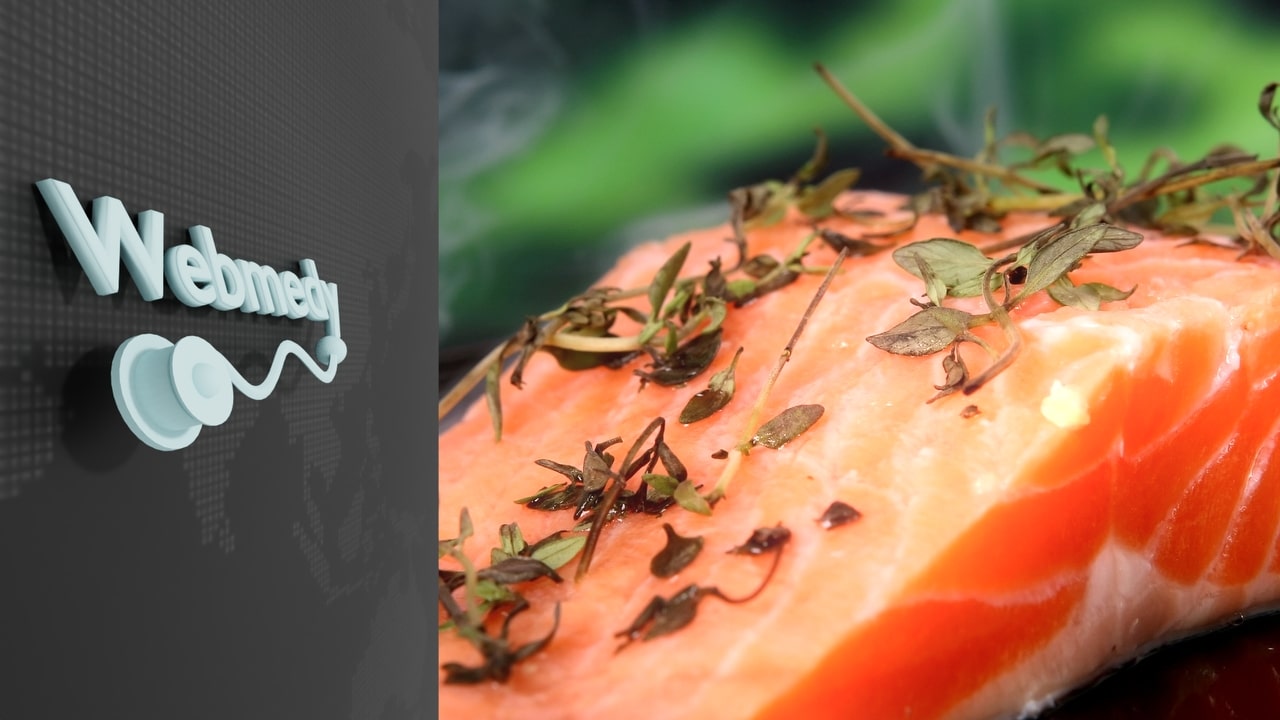
Raw salmon consumption can have positive effects on brain health. The omega-3 fatty acids present in raw salmon contribute to enhanced cognitive function. These essential fatty acids support brain development and function, promoting better memory, focus, and overall brain performance. Additionally, consuming raw salmon can reduce the risk of neurodegenerative diseases such as Alzheimer’s and Parkinson’s. The anti-inflammatory properties of omega-3s play a role in protecting brain cells and reducing oxidative stress, which are linked to these conditions. Including raw salmon in the diet can support optimal brain health and function. [17]
Enhanced Cognitive Function
Consuming raw salmon can have a positive impact on cognitive function. The omega-3 fatty acids present in raw salmon, such as DHA, contribute to improved brain health. These essential fatty acids play a crucial role in brain development and function, promoting better memory, focus, and overall cognitive performance. By incorporating raw salmon into the diet, individuals can support optimal brain health and enhance their cognitive abilities. The omega-3s in raw salmon also help protect against age-related cognitive decline and may reduce the risk of neurodegenerative diseases.
Reduced Risk Of Neurodegenerative Diseases
Consuming raw salmon can help reduce the risk of neurodegenerative diseases. The omega-3 fatty acids found in raw salmon have been shown to have neuroprotective properties, protecting the brain against degenerative diseases such as Alzheimer’s and Parkinson’s. These fatty acids help reduce inflammation and oxidative stress, which are known to contribute to the development of neurodegenerative disorders. By incorporating raw salmon into their diet, individuals can support brain health and potentially decrease their risk of developing these debilitating conditions. It is important to note that further research is still needed to fully understand the extent of the protective effects of raw salmon against neurodegenerative diseases. [21]
Raw Salmon And Skin Health
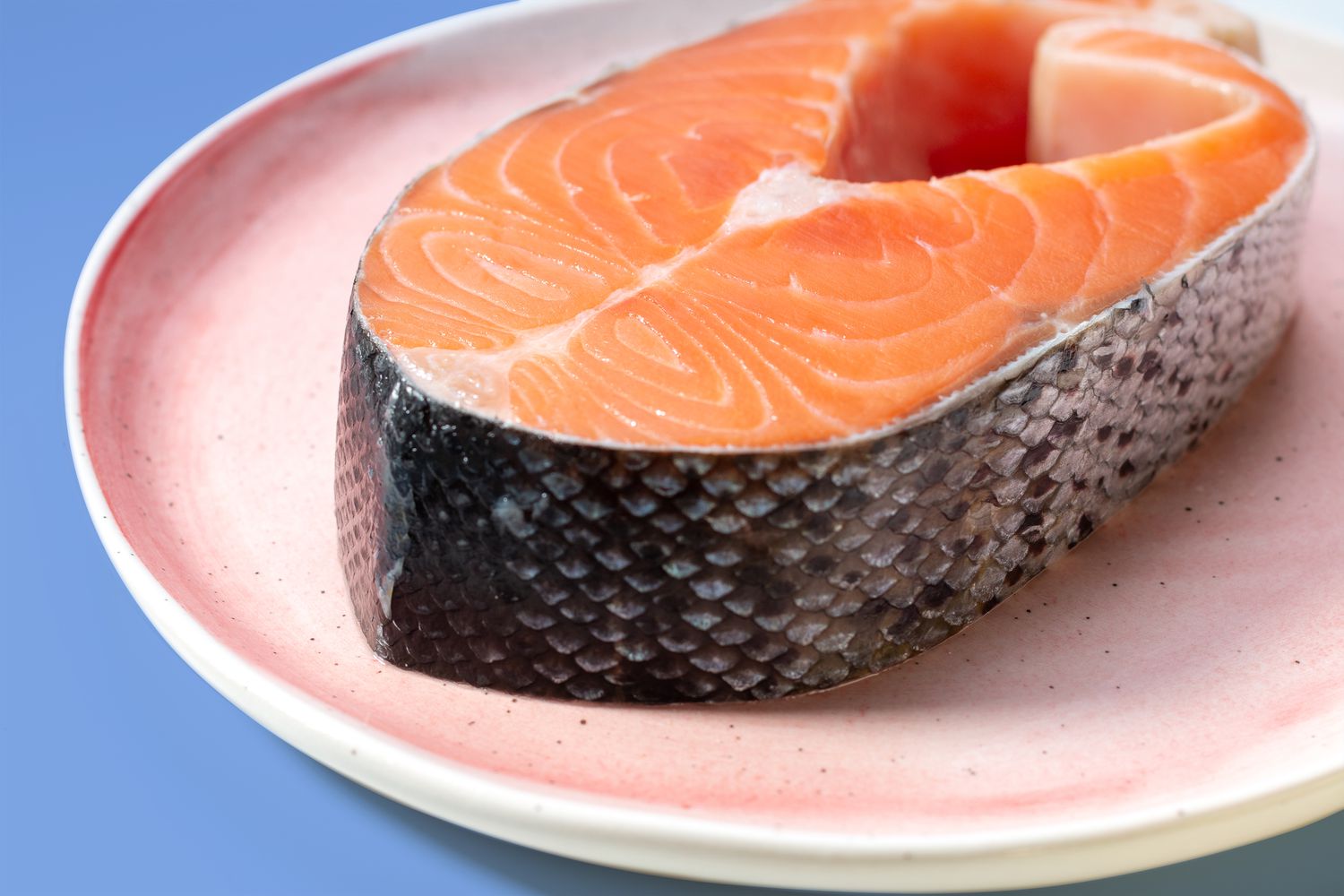
Consuming raw salmon can also have positive effects on skin health. The high levels of omega-3 fatty acids and antioxidants present in raw salmon can nourish and hydrate the skin, leading to a more youthful and radiant complexion. These nutrients help to moisturize the skin from the inside out, reducing dryness and improving overall skin texture. Additionally, the anti-inflammatory properties of raw salmon can help reduce redness and inflammation associated with skin conditions such as acne and eczema. Including raw salmon in your diet can contribute to healthier and more vibrant skin. [24]
Nourished And Hydrated Skin
Consuming raw salmon can have a positive impact on skin health, leaving it nourished and hydrated. The high levels of omega-3 fatty acids and antioxidants present in raw salmon help to moisturize the skin from the inside out, reducing dryness and improving overall texture. These nutrients also promote collagen production, which is essential for maintaining skin elasticity and preventing wrinkles. Additionally, the anti-inflammatory properties of raw salmon can reduce redness and inflammation, leading to a more even complexion. Incorporating raw salmon into your diet can contribute to healthier, more vibrant skin. [25]
Reduced Signs Of Aging
Consuming raw salmon can contribute to reduced signs of aging. The high levels of omega-3 fatty acids and antioxidants present in raw salmon help to improve skin elasticity and reduce the appearance of fine lines and wrinkles. These nutrients also protect the skin against UV damage and promote a more youthful and radiant complexion. In addition, the protein content in raw salmon supports collagen production, which is essential for maintaining skin firmness and reducing sagging. Incorporating raw salmon into your diet can help keep your skin looking youthful and vibrant. [28]
Safety Precautions When Consuming Raw Salmon
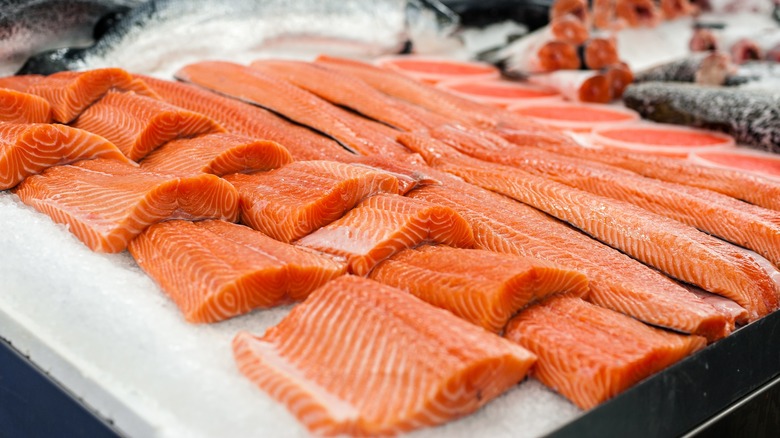
When consuming raw salmon, it is important to take certain safety precautions to minimize the risk of foodborne illnesses. These precautions include:
- Ensure freshness and quality: Only purchase raw salmon from reputable sources and check for any signs of spoilage, such as a strong fishy odor or slimy texture.
- Practice proper storage: Raw salmon should be stored in the refrigerator at a temperature below 40°F (4°C) and consumed within one to two days of purchase.
- Avoid high-risk groups: Individuals with weakened immune systems, pregnant women, young children, and elderly individuals should avoid consuming raw salmon due to a higher risk of bacteria and parasites.
By following these safety precautions, you can enjoy the health benefits of raw salmon while minimizing any potential risks.
Ensure Freshness And Quality
When consuming raw salmon, it is crucial to ensure its freshness and quality to minimize the risk of foodborne illnesses. To ensure freshness, only purchase raw salmon from reputable sources and check for any signs of spoilage, such as a strong fishy odor or slimy texture. It is also essential to check the expiration or sell-by date before purchasing. Additionally, store the raw salmon in the refrigerator at a temperature below 40°F (4°C) and consume it within one to two days of purchase to maintain its freshness and quality. Following these precautions will help ensure a safe and enjoyable consumption of raw salmon.
Avoid Consuming Raw Salmon If At High Risk Group
Consuming raw salmon can be risky for individuals who are in the high-risk group for foodborne illnesses. This includes pregnant women, young children, older adults, and those with weakened immune systems. Raw salmon may contain bacteria, parasites, or viruses that can cause food poisoning, which can be particularly dangerous for these vulnerable populations. It is recommended that individuals in the high-risk group avoid consuming raw salmon and opt for cooked salmon instead. Cooking salmon thoroughly can help eliminate any potential pathogens and ensure safe consumption.
Frequently Asked Questions about Raw Salmon Benefits
- What are the health benefits of consuming raw salmon?
Consuming raw salmon offers several health benefits. It is an excellent source of high-quality protein, omega-3 fatty acids, vitamins, and minerals. The omega-3 fatty acids found in raw salmon promote heart health, reduce inflammation, and support brain function. - Is raw salmon safe to eat?
Raw salmon can be safe to eat if it is fresh, high-quality, and properly handled. Ensuring that the fish has been frozen at the correct temperature for a specific period helps kill any parasites that may be present. It is crucial to buy raw salmon from trusted sources and follow proper food safety practices. - What is the difference between raw salmon and cooked salmon?
The main difference lies in the texture and flavor. Raw salmon has a soft, buttery texture and a delicate flavor, whereas cooked salmon tends to be firmer with enhanced flavors due to the cooking process. Some nutrients are also lost during cooking, so consuming raw salmon allows for maximum nutrient absorption. - Are there any nutritional differences between raw and cooked salmon?
Raw and cooked salmon have similar nutritional profiles, but there may be slight variations due to the cooking process. While raw salmon retains its omega-3 fatty acids and vitamin content, cooked salmon may experience minimal loss of these nutrients. However, the protein content remains intact in both raw and cooked forms. - Can anyone consume raw salmon, or are there exceptions?
While raw salmon can be enjoyed by many, certain individuals should exercise caution. People with compromised immune systems, pregnant women, young children, and older adults may be more susceptible to foodborne illnesses. It is advisable for these groups to consult with a healthcare professional before consuming raw fish. - How can I incorporate raw salmon into my diet?
Raw salmon is commonly enjoyed in sushi and sashimi dishes. Sushi rolls, nigiri, or sashimi platters provide a delicious and healthy way to include raw salmon in your diet. You can also create poke bowls, ceviche, or gravlax using raw salmon. It’s important to ensure the quality and freshness of the fish when preparing raw dishes. - Should I be concerned about mercury levels in raw salmon?
Salmon is known to have low levels of mercury compared to other fish species. Most wild-caught salmon, such as sockeye or coho, have relatively low mercury content. However, pregnant women and nursing mothers should be cautious and limit their consumption of raw salmon due to mercury concerns. Consulting with a healthcare professional is advisable in such cases. - What are some tips for selecting fresh raw salmon?
When selecting raw salmon, look for fish that has bright, firm, and translucent flesh. It should have a mild oceanic aroma. The eyes of the fish should be clear and not cloudy. Avoid fish with a strong fishy smell, dull flesh, or slimy texture, as these may indicate poor quality or spoilage. - How should raw salmon be stored?
Raw salmon should be stored properly to maintain its freshness. It is recommended to store it in the coldest part of the refrigerator and consume it as soon as possible. If not consumed within a day or two, raw salmon should be tightly wrapped in plastic wrap and frozen at or below 0°F (-18°C) to prevent spoilage.
Remember, if you have any specific dietary concerns or medical conditions, it is always best to consult with a healthcare professional before making significant changes to your diet.

A small, independently run fish and chip shop using quality ingredients cooked freshly in our kitchen to ensure great tasting food. All of our drinks are in glass bottles, and all of our takeaway packaging is recyclable or compostable to help reduce our impact on the environment.